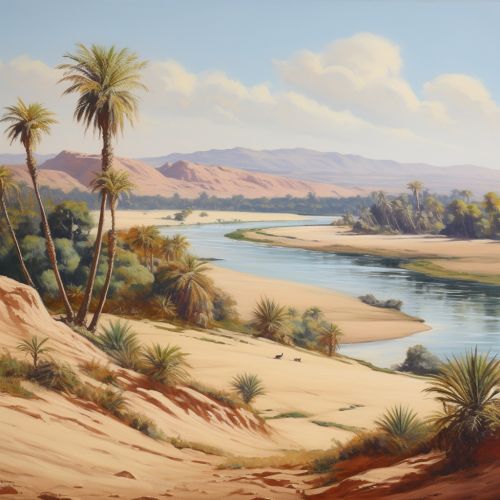Ancient Egyptians
Introduction
The Ancient Egyptians were a civilization of ancient Northeastern Africa, concentrated along the lower reaches of the Nile River in the place that is now the country Egypt. This civilization started around 3100 BC with the political unification of Upper and Lower Egypt under the first pharaoh and continued to thrive over the next three millennia.
Geography
The geography of ancient Egypt was dominated, as is today, by the combination of lack of rainfall and the Nile River. The Greek historian Herodotus called Egypt the "gift of the Nile", since the kingdom owed its survival to the annual flooding of the Nile and the resulting depositing of fertile silt.


Society
The society of ancient Egypt was divided into various social classes, from the Pharaoh at the top, to farmers and slaves at the bottom. The classes were incredibly hierarchical, and mobility between them was not common.
Religion
Religion was a central part of ancient Egyptian life. The Egyptians worshipped many deities, with a belief in the divine right of the Pharaoh. They built large temples, such as the Temple of Karnak, and created intricate burial practices, such as mummification, to honor their gods and ensure their own immortality.
Language
The ancient Egyptians spoke the Egyptian language, which evolved into Demotic and later into Coptic. The Egyptian Hieroglyphs were the formal writing system used by the ancient Egyptians, which contained a combination of logographic, syllabic, and alphabetic elements.
Art
Ancient Egyptian art includes painting, sculpture, architecture, and other forms of art, such as drawings on papyrus, created between 3000 BC and 100 AD. Most of this art was highly stylized and symbolic. Many of the surviving forms come from tombs and monuments, giving more insight into the ancient Egyptian afterlife beliefs.
Legacy
The legacy of Ancient Egypt, with its hieroglyphs, temples and pyramids, has endured over millennia. Ancient Egypt has left a lasting legacy in many fields, including art, architecture, and technology. The civilization's gods and symbols are recognized by millions around the world, and Egypt's influence can be felt in various aspects of modern culture.
